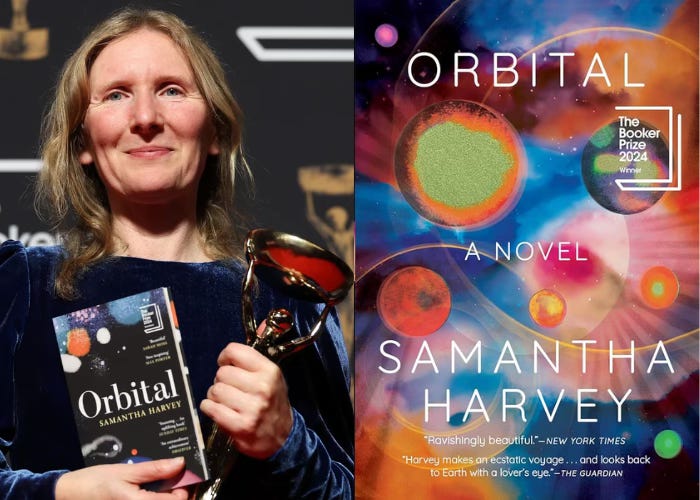Our Peak Into the Heavens
‘Orbital’ by Samantha Harvey and Notes On Our Tiny, Glowing Home
Announced on November 12, 2024, Orbital by Samantha Harvey wins the 54th annual Booker Prize— the first set in space, and at 136 pages, the second-shortest.
“From a fantastically strong shortlist, they have chosen their winner, a small, strange, beautiful, and mighty book…Orbital wins the prize in a year of geopolitical crisis, likely to be the warmest year in recorded history,” (Wood, 20241).
The novel is a tiny one that chronicles four astronauts from America, Japan, Britain, Italy, and two cosmonauts from Russia over the span of 24 hours as their space craft orbits around the Earth. So far away from home, the characters have never felt so connected to its liveliness as the news of the death of a mother reaches them, tsunamis and disasters strike their homes, and they yearn to be with their lovers. The characters each merge, interchange internal monologues, and contemplate that it is a miracle they were even created.
“In the cosmic calendar of the universe and life, with the Big Bang happening on January 1st almost fourteen billion years ago, when a supercharged universe-dense speck of energy blew open … an explosion that had to create the space it exploded into since there was no space, no something, no nothing, it was near the end of January that the first galaxies were born, almost a whole month and a billion years of atoms moving in cosmic commotion until they began to flock bombshell-bright in furnaces of hydrogen and helium we now call stars, the stars themselves flocking into galaxies until, almost two billion years later on March 16th, one of these galaxies, the Milky Way, was formed … September 14th, four billion years ago (or some think) came life of sorts” (pp, 169-170).
Then, approximately 300,000 years after humans emerge, a soft-spoken woman with a knack for writing novels takes the stage of a dazzling building in the heart of London to accept the trophy for her award-winning novel that celebrated the beauty of this series of creational, haphazard collisions.
Harvey speaks into the microphone at the Booker ceremony:
“We are, as Carl Sagan says in his book Cosmos, ‘The local embodiment of a consciousness grown to self-awareness. We are star stuff pondering the stars.’ And I would add that we are also Earth stuff pondering the Earth. And I think my novel is an exercise in that pondering. To look at Earth from space is a bit like a child looking into a mirror and realizing, for the first time, that the person in the mirror is herself. What we do to the Earth, we do to ourselves, and what we do to life on Earth, human and otherwise, we do to ourselves. ‘Our loyalty,’ Sagan says, ‘are to the species and to the planet. We need to speak for Earth,’ he says. I would like to dedicate this prize, therefore, to everyone who does speak for, and not against, the Earth.” (Harvey, 20242).
She writes her characters and the narrative in this manner. At the times, descriptions of activities on the space ship overlap with human activity on Earth.
Here are four remarkable instances: (a) lover back home overlaps with the description of the Earth itself and human activity on it: “to bring to mind Lincoln and the Ice Age and the hieroglyphs of ancient Egypt and whatever grand things had shaped the earth… every thought cascaded into the dark brows and proud nose of her lover, the wonderful articulation of his hands and the way he listened like a bird and how they had touched so often without touching… she thought of the great city of Alexandria and of nuclear disarmament and the symphony of earth’s tides and the squareness of his jaw” (p. 133). (b) the death of a mother reveals a bygone foreshadowing of the decision to become an astronaut: “… it wasn’t until her mother gave her the photo before this mission that she remembered those thoughts, and felt their charge and the force of the past and how the past is so stealthy in making the future - because she’s sure looking back that this photo had generated her first thought of space” (p.87); (c) the fear of death brings comfort from a wife extolling the possibility of becoming stardust: “take heart, his wife once said, if you perish up there the millions of bits of you will be orbiting the earth; that’s a good thought isn't it?” (p. 73); and (d) the borderless world they’re observing becomes them and, for a second, they’re nationless and free of division. One unified front. “They have talked about a feeling they often have, a feeling of merging. They are not quite distinct from one another, nor the spaceship. Whatever they were before they came here, whatever their differences in training or background, in motive or character, whatever country they hail from and however their nations clash, they are equalized here by the delicate might of their spaceship.” (p. 28).
Though they feel the absence of their division, they see the effects of humanity’s brutal politics which are so obviously a grave threat to their home’s gentleness. The gentleness: “Before long, for all of them, a desire takes hold. It’s the desire — no the need (fueled by fervour) — to protect this huge yet tiny earth. This thing of such miraculous and bizarre loveliness. This thing that is, given the poor choice of alternatives, so unmistakably home. An unbounded place, a suspended jewel so shockingly bright” (p. 108). The threat to the gentleness: “… they come to see that it’s not a pantomime, or it’s not just that. It’s a force so great that it has shaped every single thing on the surface of the earth that they had thought, from here, so human-proof… The hand of politics is so visible from their vantage point that they don’t know how they could have missed it at first.” (pp. 110-111).
With Creation, comes the question of a Creator. No matter what you believe, what name you give to what you believe, or whether or not you believe, the belief and non belief come from the same place. It’s rooted in the same Creation. “(She) wants sometimes to ask (Him) how it is he can be an astronaut and believe in God, a Creationist God that is, but she knows what his answer would be. He’d ask how it is she can be an astronaut and not believe in God… She’d point out of the port and starboard windows where the darkness is endless and ferocious. Where the solar systems and galaxies are violently scattered… Look, she’d say. What made that but some heedless hurling beautiful force? And (he) would point our of the port and starboard windows, at… exactly the same violent scattered solar system…. and he would say: what made that but some heedful hurling beautiful force? Is that all the difference there is between their views then - a bit of heed? Is (his) universe just the same as hers but made with care, to a design? Hers an occurrence of nature and his an artwork?” (pp. 66-67).
Above all, this novel made me realize that if, in the end, there is no God (no matter the name we’ve given them), I would not regret my endless casting of gratitude into our sufficient universe, into the energy of Creation that - because of it - by a small percentage of chance, humanity is walking the planet. I am walking the planet.
I will not regret the love and somewhat blind optimism I’ve harbored for Creation: the rivers that run wildly while being guzzled by humanity’s greed, the sparkling grey gulfs that are eating away at coasts, the tiny curious creatures that are constantly crawling, squirming, running, flying, the beastly ancient trees.
And my people. Humanity.
Singing, barefoot, whimsical humanity who are vandals of the plants we grew, honeybees and chimpanzees we’ve befriended, and species we’ve given names to. Humanity who — if what we do to the Earth, we do to ourselves — are in the midst of committing a slow suicide. And who — if what we do to life on Earth, we do to ourselves — are in the process of formulating our own mass extinction.
Orbital is a timeless labor of love to both the Universe itself and our tiny home that is tucked snuggly within it. Authors that can manage to write chunky, mesmerizing prose have such a soft spot in my heart. Harvey is one of them. She has written this much-needed novel in such a profound, beguiling way. The 2024 Booker Prize was much deserved.
Earth is our current heaven. It is “the face of an exulted lover…a mother waiting for her children to return” (p.4).
Earth is the lively beat of our heart, the trees within it, our breath. Without it, we have nothing. Without it, we are nothing.
Yulani Sann
Wood, Gaby. Chief of Executive of the Booker Prize Foundation: “Orbital by Samantha Harvey wins the Booker Prize 2024”, The Booker Prize, 12 Nov 2024. Web. Accessed: https://thebookerprizes.substack.com/p/orbital-by-samantha-harvey-wins-the 19 Dec 2024. [
]“Samantha Harvey wins the Booker Prize 2024 with Orbital.” The Booker Prizes, Accessed: https://youtu.be.com/VT6BZ6gyYYY 12 November 2024.
Other Works Cited
Harvey, Samantha. Orbital. New York: Grove Press, 2023. Print.






